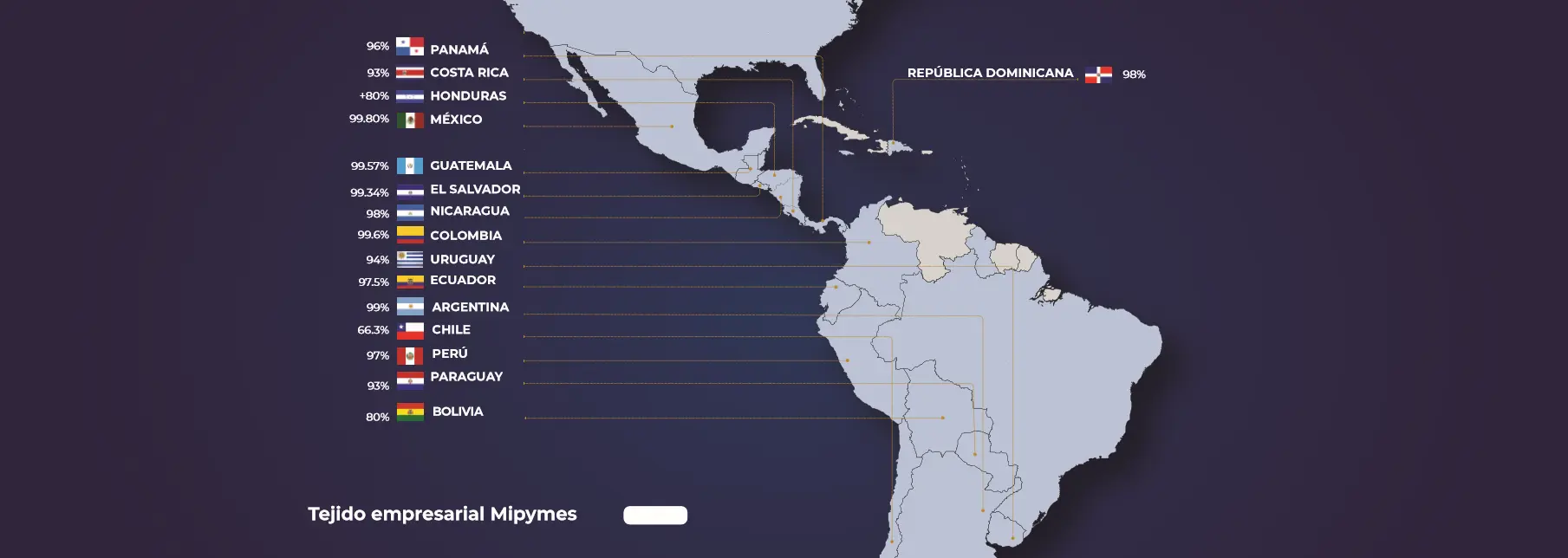ECONOMY| 01.01.2021
Opportunities and challenges for the insurance industry regarding the protection of SMEs in the Dominican Republic
Micro, small and medium-sized enterprises (MSMEs) are at the heart of the business fabric and job creation in Latin America and the Caribbean. However, the lack of regularization is one of the most common characteristics of SMEs in the region, leading to high levels of socio-economic vulnerability and putting the survival of these businesses at risk when faced with any unforeseen event.
According to data from the Economic Commission for Latin America and the Caribbean (ECLAC), micro, small and medium-sized enterprises account for 99 percent of the industrial fabric, thus generating the majority of jobs. In the Dominican Republic, MSMEs make up 98 percent of the business fabric, comprising 38.6 percent of GDP and generating more than 2,500,000 jobs (over 60 percent of formal employment in the region, according to a ‘Mipymes’ [MSMEs] report). Specifically, one in three job positions are attributable to SMEs.
Micro-enterprises have a majority presence in every sector of the economy. In some cases, they constitute more than 90 percent of businesses within a sector throughout Latin America, with commerce being the sector in which the largest number of formal micro-enterprises are concentrated.

Presence of micro-enterprises. Source: ‘Mipymes’ (MSMEs)
Vulnerability, precariousness and lack of social protection: The problem concerning the lack of regularization of SMEs in the country
In the Dominican Republic, as in most countries in Latin America and the Caribbean, the lack of regularization is one of the main characteristics of micro, small and medium-sized enterprises, according to data from the ‘Observatorio Mipymes‘ (MSME Observatory).
This situation precipitates high levels of socio-economic vulnerability, in addition to precariousness and the absence of social protection. It also has negative effects on productivity and competitiveness, making it necessary to thoroughly review the situation faced by SMEs in the country. And the insurance industry has a lot to contribute in that regard.
“At MAPFRE BHD, we support the growth of small and medium-sized enterprises and the revitalization of the sector in the country.” We are committed to protecting your investment while you watch your business prosper and achieve your dreams. “Our doors are open to offer advice and provide the insurance solutions you need in order to feel calm and confident,” explained Zaida Gabas de Requena, CEO of MAPFRE BHD Insurance.
Nine out of ten business owners say they operate as an unregistered business, either under single (88.8 percent) or multiple (1 percent) ownership. In other words, just 10.2 percent of micro-enterprise owners register their business correctly. Women-owned businesses have even more limitations (4.7 percent) than those owned by men (15.1 percent) when it comes to being able to issue invoices for their merchandise or services with a tax receipt, which serves to increase the socio-economic vulnerability of women business owners.
One of the most influential factors with regard to the administrative and accounting side of businesses is the owner’s level of education. As the owner’s years of academic training increase, so does the level of regularization. Only one in five owners without any formal education care about keeping an accounting record for the business.
In short, the lack of accounting control undoubtedly leads to extremely high levels of vulnerability for the business, to the extent that it is common for owners not to distinguish between money for their business and their home life, thereby endangering the financial health of both the family and the business.
“The Life insurance protection gap in the Dominican Republic is one of the largest in the Latin American and Caribbean region,” Ricardo González, Director of Analysis, Sectorial Research and Regulation at MAPFRE Economics.
Insurance can make the difference between an SME that survives and one that doesn’t
According to a study by MAPFRE BHD, small and medium-sized business owners say that the main difficulties or obstacles to their business activity are: paying taxes, delays in client payments and accessing bank credit, among others.
The small and medium-sized businesses that were consulted say that the most significant risks are fires and theft. These are the types of coverage that are most commonly taken out. Given that most are family-run SMEs, Life Insurance is also important.
In this sense, “the Life insurance protection gap in the Dominican Republic is one of the largest in the Latin American and Caribbean region,” said Ricardo González, Director of Analysis, Sectorial Research and Regulation at MAPFRE Economics.
The insurance industry therefore has a great opportunity and a certain responsibility to show SME owners in the country how they can protect themselves so as to ensure the continuity of their business in the face of any unforeseen events.
MAPFRE BHD, paving the way for the protection of SMEs in the Dominican Republic
MAPFRE BHD was the first insurer to offer this type of policy in the country. Multirisk insurance protects small and medium-sized enterprises from the risks they are exposed to. It is an insurance solution that does not focus on protecting against specific damage; on the contrary, it offers different types of coverage within the same policy and the guarantee of emergency assistance.
Multirisk insurance was created owing to SME owners needing protection in order to guarantee the business’ recovery and stability after having suffered some form of damage. MAPFRE BHD carried out research that revealed the interest among SME owners of having insurance that provided different types of coverage under the same policy. So, the company designed a product offering those features and backed by the MAPFRE brand’s guarantee of support, experience and service in the country.
